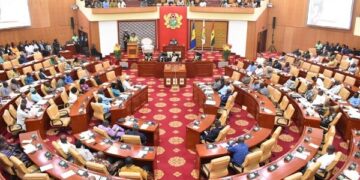The Finance Ministry in the issuance of its 91,182 and 364 days treasury bills exceeded its target of raising GH¢ 2.58bn.
The Treasury in the auction of the short-term securities exceeded its target by some GH¢510m as it managed to raise GH¢3.09bn from the debt market.
This is after it missed its GH¢3.75bn target by GH¢414m in the previous auction.
Bids for the 91, 182 and 364 days T-Bills amounted to GH¢2,143 million, GH¢674 million and GH¢433 million respectively with the Government accepting bids amounting to GH¢2,114m, GH¢548m and GHS 433m made for the 91, 182 and 364-day T-Bill.
The 91, 182 and 364-day T-Bills were auctioned at interest rates of 28.5%, 30.6% and 32.5% respectively.
On average, the Government’s interest cost on T-Bills stands at 30.5%.
Despite the high rates on T-Bills, real returns on the short-term debt instruments are still negative given that the rates are below the prevailing inflation rate of 40.1%.
Total outstanding T-Bills issued by the Government as of August 2023 stood at GHS 55bn.
With interest rates on T-Bills hovering between 28% and 32%, Government is expected to make interest payments above GHS 17bn per annum.
Meanwhile, the Bank of Ghana has revealed that Ghana’s public debt witnessed a notable uptick, surging by approximately ¢6.3 billion during the second quarter of 2023. This substantial increase propelled the nation’s total debt to ¢575.5 billion, which translates to some $52.3 billion.
Strikingly, this figure represents a significant 71.9% of Ghana’s Gross Domestic Product (GDP).
Breaking down the components of Ghana’s public debt, data from the Central Bank discloses that the external component reached $29.9 billion (¢328.6 billion) in June 2023, surpassing the figure recorded in April 2023, which stood at $29.3 billion (¢321.3 billion).
In contrast, the domestic debt stood at ¢246.9 billion at the close of June 2023, constituting approximately 30.8% of the nation’s GDP.




















































































